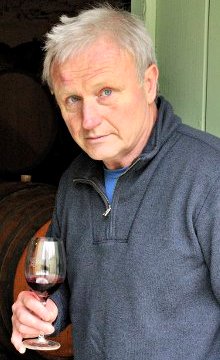"Order my book on the Roussillon direct saving £4/€4 (UK & EU only) or download the Kindle eBook on Amazon UK . Buy it in the USA ...

Updates posted November 2013: see link below.
There's a lot of talk about "low or no sulphite" wines, and enough examples out there to remind us why most winemakers DON'T go down this more challenging route (sulphur dioxide and related additives are basically used as anti-bacterial agent, antioxidant and preservative).

Valdibella is a mini co-operative winery set up in the late 90s, although the local 'crops' - grapes (mostly indigenous varieties), almonds (apparently there are 90 types grown in this region) and olives - have been farmed organically here for longer, as sustainable nature is the members' central common ethos. The company is also a community spirited employer and lobbying organization that supports "young people in difficulty" and the Addiopizzo movement against "mafia rackets," as it says on their site. Its six members include Massimiliano Solano, Luigi Montalbano, Gioacchino Accardo, Pietro Scardino and Filippo Giglione, who between them own 38 ha (95 acres) of undulating vineyards around Camporeale and Monreale, on the western side of Sicily inland from Palermo, planted on slopes up to 500 metres (1640 feet above sea level). The people at the co-op have also written their own biodiversity and winemaking charter - see www.valdibella.com - including a low or no sulphite policy, which is a tricky path to tip-toe down and not entirely successful in all of the wines I tried, although some of them are deliciously quirky with it. They're rather proud of their Catarratto too, an old and widely-planted Sicilian white variety, which you'll find here as 50 year-old bush vines and made into three different wines. Same story for Perricone, an almost extinct red grape vine indigenous to western Sicily. Encountered at this year's Millesime Bio organic wine show in Montpellier.
2010 Isolano (100% Catarratto "Extra Lucido") - appley nutty 'natural' style with lovely bite and intense finish.
2011 Ariddu (Grillo) - wild yeast-leesy nose, fairly rich mouth-feel vs crisp mineral bite and citrus fruits, concentrated and lively finish. Yum, very nice white.
2010 Acamante (Perricone) - perfumed and peppery with floral cherry notes, tasty palate with quite soft vs dry tannins. Different and good with it.
2011 Respiro (Nero d'Avola, no SO2 hence the name presumably meaning "breath") - a little baked/oxidised and meaty on the nose vs ripe dark fruit combo, attractive supple tannins. Was a vat sample though so might not have travelled well!
2010 Respiro - similar nose although fruitier vs those developed meaty edges, concentrated chunky mouth-feel vs rounded tannins. Good stuff.
2010 Jaki (50-50 Cabernet Sauvignon-Nero d'Avola) - dark 'tar' like aromas, rich extracted palate with again those nice tannins, very ripe oily character almost vs enticing savoury meaty maturing edges. Wow, a bit odd but delicious with it.
Background: Château de Flandry, Limoux, Languedoc by RMJ. Header: Lavail Vigne, Roussillon © CIVR.



